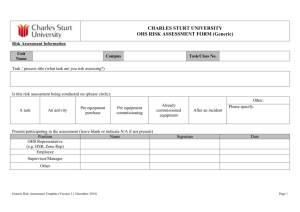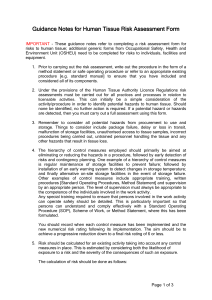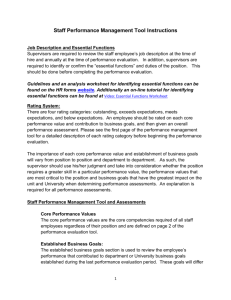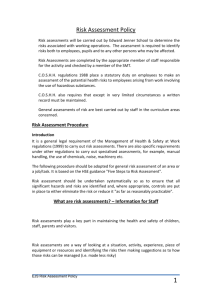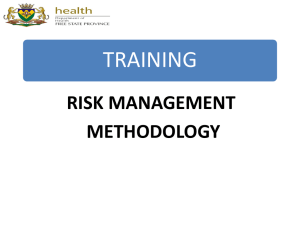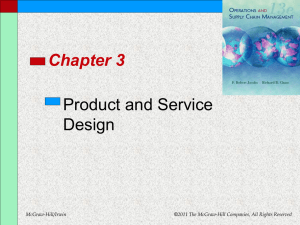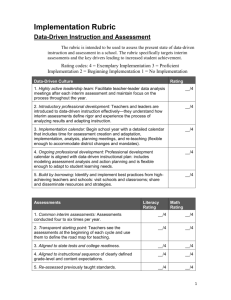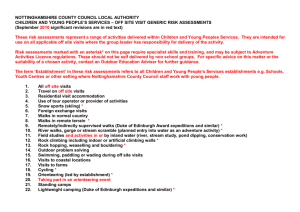guidance on using generic risk assessments
advertisement
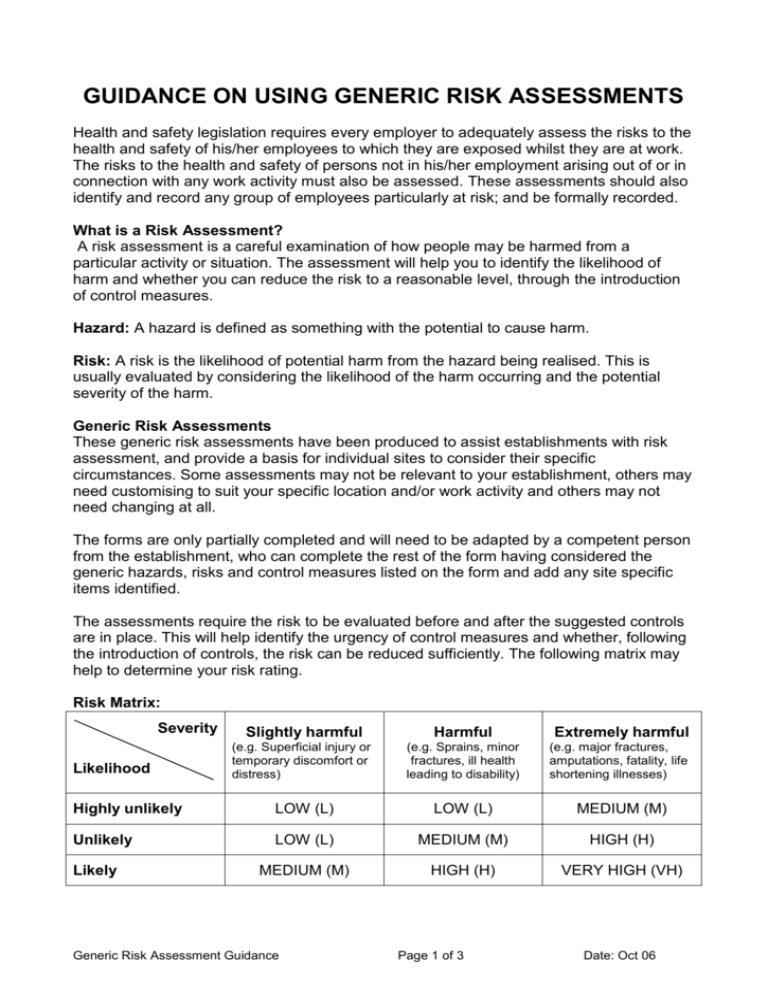
GUIDANCE ON USING GENERIC RISK ASSESSMENTS Health and safety legislation requires every employer to adequately assess the risks to the health and safety of his/her employees to which they are exposed whilst they are at work. The risks to the health and safety of persons not in his/her employment arising out of or in connection with any work activity must also be assessed. These assessments should also identify and record any group of employees particularly at risk; and be formally recorded. What is a Risk Assessment? A risk assessment is a careful examination of how people may be harmed from a particular activity or situation. The assessment will help you to identify the likelihood of harm and whether you can reduce the risk to a reasonable level, through the introduction of control measures. Hazard: A hazard is defined as something with the potential to cause harm. Risk: A risk is the likelihood of potential harm from the hazard being realised. This is usually evaluated by considering the likelihood of the harm occurring and the potential severity of the harm. Generic Risk Assessments These generic risk assessments have been produced to assist establishments with risk assessment, and provide a basis for individual sites to consider their specific circumstances. Some assessments may not be relevant to your establishment, others may need customising to suit your specific location and/or work activity and others may not need changing at all. The forms are only partially completed and will need to be adapted by a competent person from the establishment, who can complete the rest of the form having considered the generic hazards, risks and control measures listed on the form and add any site specific items identified. The assessments require the risk to be evaluated before and after the suggested controls are in place. This will help identify the urgency of control measures and whether, following the introduction of controls, the risk can be reduced sufficiently. The following matrix may help to determine your risk rating. Risk Matrix: Severity Slightly harmful Harmful Extremely harmful (e.g. Superficial injury or temporary discomfort or distress) (e.g. Sprains, minor fractures, ill health leading to disability) (e.g. major fractures, amputations, fatality, life shortening illnesses) Highly unlikely LOW (L) LOW (L) MEDIUM (M) Unlikely LOW (L) MEDIUM (M) HIGH (H) MEDIUM (M) HIGH (H) VERY HIGH (VH) Likelihood Likely Generic Risk Assessment Guidance Page 1 of 3 Date: Oct 06 It is unlikely that all risks can be reduced to low levels. Table 1 will help you to determine action that needs to be taken. Table 1: Risk Rating Action required Initial risk rating Very High (VH) Residual risk rating May only take place if good control measures can be implemented. Must not take place. High (H) May only take place if good control measures can be implemented. Seek further advice Medium (M) If it is not possible to lower risk further, you will need to consider the risk against the benefit. Low (L) No further action required. You will need to identify further controls to reduce the risk rating. The completed generic assessments will need to be signed off by the person completing the assessment and the establishment manager. They will then need to be reviewed and if necessary updated, at least annually. A review will be required sooner if an incident or accident occurs, or there are significant changes to the premises, staff or procedures. Further Guidance If you require any further assistance with completing these generic risk assessments contact the Education Health and Safety Team Room 4/5 County Hall Hertford SG13 8DF Csf.healthandsafety@hertscc.gov.uk Telephone: 01992 556478 Fax: 01992 555962 For guidance on carrying out risk assessments for curriculum activities please check the information available from the following sources: Hertfordshire County Council School Improvement and Advisory Service Design and Technology Health and Safety Guidelines CLEAPSS School Science Service Laboratory Handbook Hertfordshire County Council Children, Schools and Families Offsite Visits Manual County Curriculum Advisers based at Wheathampstead Development Centre Generic Risk Assessment Guidance Page 2 of 3 Date: Oct 06 GENERIC RISK ASSESSMENT Establishment: Activity or location being assessed Assessment by: Who carried out this assessment Review Date: Approved by: e.g. Manager, Technical Adviser Record proposed date of review Hazard / Risk Consider the generic hazards and risks listed in this column. Add any sitespecific hazards you have identified. Who is at Risk? Initial Risk Rating Pupils, staff, the public etc. Consid -er those with special needs. Before controls are applied. Use the risk matrix to help you rate the risk Normal Control Measures (Brief description and/or reference to source of information). Consider the control measures listed here. If you identify any other control measure you have on your site, add them to the list. Date: Date: Are Control Measures Y/N/NA In Place Adequate Are the control measures in place? Are they adequate? Additional Control Measures (to take account of local/individual circumstances). Record additional controls you have identified and the date they were implemented. Ensure that you address anything highlighted under normal controls as needing action. Residual Risk Rating With all controls in place. Use the risk matrix to help you. Rate the risk. Look at Table 1 to see if further action is required. REVIEWS: DATE OF Record REVIEW: actual date of review REVIEWED BY: Who carried out the review? COMMENTS: Record any comments reviewer wishes to make. Including recommendations for future reviews. DATE OF REVIEW: REVIEWED BY: COMMENTS: Generic Risk Assessment Guidance Page 3 of 3 Date: Oct 06
